To celebrate International Women’s Day 2022, Team Charco has talked to just a few of the truly inspiring women in our community, to find out more about them, what they consider to be their biggest success, and to show everyone why we find them so inspirational. We hope you enjoy their stories :).
Tina Noble
Taking Each Day as it Comes
Tina has been a part of Charco’s journey almost from the beginning, and has been a great supporter throughout the years. First diagnosed with Young Onset Parkinson’s at 43, she found it difficult to talk to anyone about her condition at first.
“I was absolutely devastated when I first found out I had Parkinson’s; it took me three years before I could really talk about it.” After a difficult three years, Tina decided to join her local Parkinson’s group to learn more and meet other members of the Parkinson’s community. She told us that she felt that waiting to take this step was necessary for her.
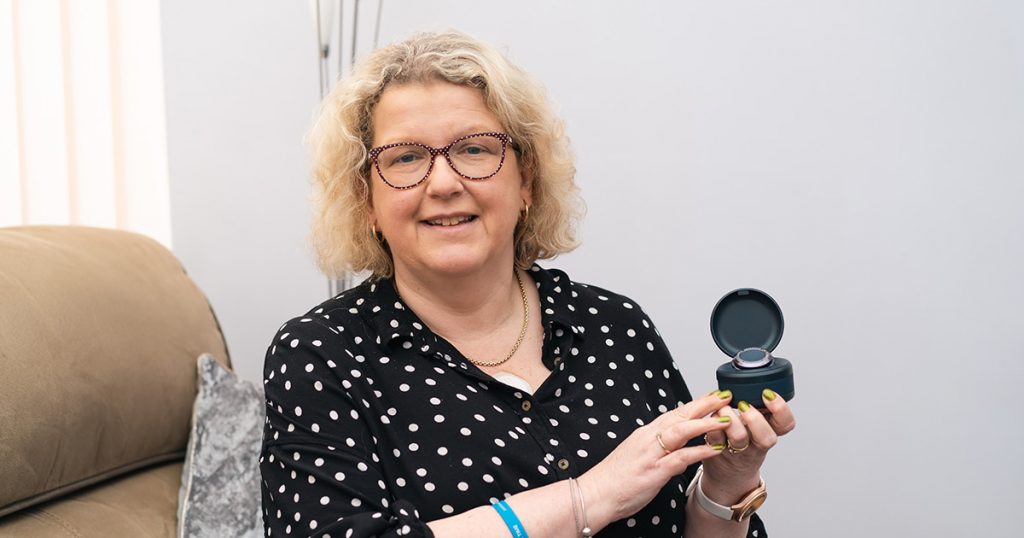
“I went three years later, and that was the right time for me.” Since joining, she’s gone on to become a part of the committee. Tina even saved the group £3000 in her first year on the team by cleverly innovating their raffle system, making her a much appreciated member.
She has since gone on to become involved in many aspects of the Parkinson’s community, with her latest focus being on a new project, working with others to establish a Young Onset Parkinson’s group in her local area.
“When I was diagnosed, there was little or no help available for younger people”, Tina tells us, “and so I think it’s important to have a group for people of working age. I think it helps to talk to like-minded people.” Tina’s honesty and openness about her Parkinson’s has helped others in similar positions. At a recent event, Tina gave a talk about her experiences, and was surprised afterwards that so many people came up to her to thank her for sharing her experiences, as it had made them feel less alone.
“They told me that they thought I was inspirational, and how they could relate to what I’d said.” Tina’s openness has been a great help to many, and her continuing efforts to help those with YOPD by sharing her story is undoubtedly improving the lives of those she comes into contact with. Tina agrees that sharing experiences is crucial to helping others to learn to live with Parkinson’s, though she laughs humbly when we tell her she’s an inspiration for doing so.
Tina’s experiences with Parkinson’s have undoubtedly changed her. “I think my priorities have changed”, she tells us, smiling. “I don’t worry about the small things any more, as they just aren’t worth the bother.”
Though Tina worked for the civil service for another decade after her diagnosis, she eventually decided to leave . “I had a lightbulb moment, in which I thought ‘There’s more to life than this’, and so I put in for ill health retirement.” Parkinson’s has changed Tina’s life forever, and she tells us with a forthright honesty that she has “had some very dark days, and some hard times, but life goes on.” Tina’s stoical attitude to life has helped her to learn to live with Parkinson’s, and has helped her to really narrow down what matters to her in life, allowing her to focus on the important things.
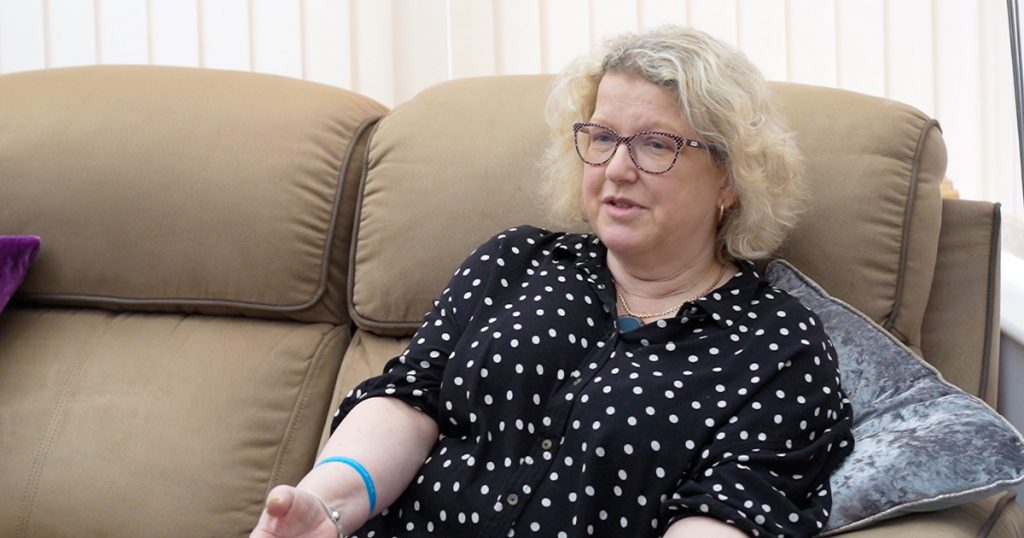
We ask Tina what her proudest achievement is; what would she say the greatest success of her life is? “Obviously my boys”, Tina says, tearing up. She has two sons, and her pride is obvious as she talks about them. “They’re my great achievement in life; one lives in America with his wife, while the other is in the police here in the UK.” Tina smiles and wipes a tear from her eyes. “I always get emotional when I talk about them. They roll their eyes and go ‘Mum’s crying again!’” she tells us, laughing.
Her two sons were 12 and 15 respectively when Tina was diagnosed with Parkinson’s, and though she found it difficult at first to come terms with her condition alongside being a full time mum, she tells us “I was glad to have had the earlier years with them in good health, and now they’re both happy and going off in life.” Tina tells us that her family isn’t yet complete, however, and that her sons still have work to do. “I want to be a grandma! I’d love them to give me some grandchildren; I think that’ll complete things.” Tina’s focus and pride in her family is truly heartwarming, and we know that she will make an amazing grandmother one day.
Tina’s come through some difficult times, and has shifted her focus to what truly matters in life: her family, and helping others. Her stoical attitude and open, honest approach to sharing her experiences is something we find truly inspiring, and we never cease to be amazed by Tina’s outlook on life. She sums up her philosophy with characteristic clarity. “It’s just kind of taking each day as it comes, and not worrying too much about things in the distant future.”
Emma Green
Finding the right balance
When we last talked to Emma, she was finding her place in the Parkinson’s community, and trying a variety of new things to see what she enjoyed. We were excited to find out how she’s been since our last meeting, and to find out more about what she believes makes a successful woman.
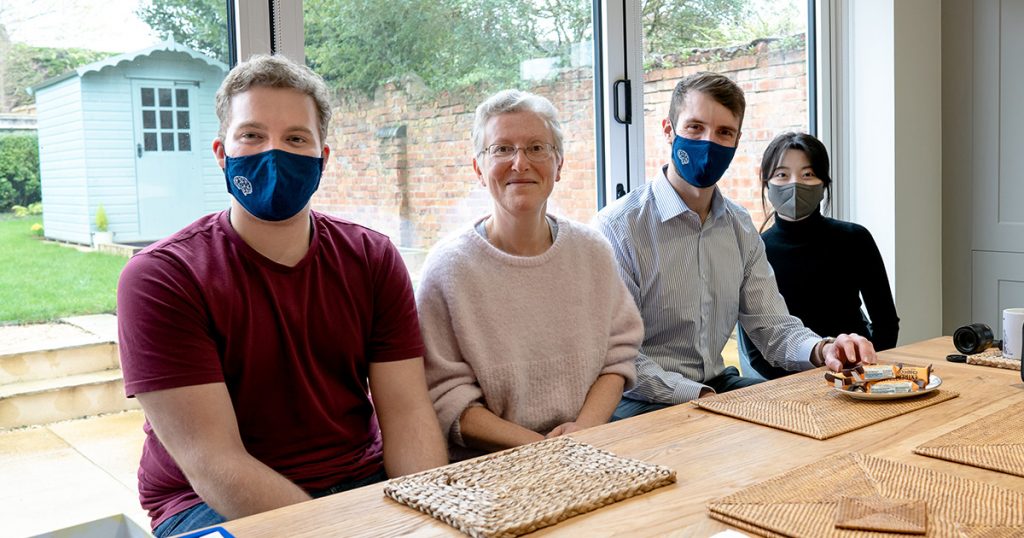
“To understand me, you really need to see this.” Emma brings out a Venn diagram with three sections, labelled physical, mental, and spiritual respectively. In each part, Emma has written down the things she does to ensure that she leads the best life possible, with many overlapping. Under ‘physical’, Emma has written ‘rowing machine’; having talked about it in our last blog, she’s keen to tell us more. “I enjoyed the rowing side of things, but I found that doing it in a group just wasn’t for me. I wanted to take things at my own pace, and not feel guilty for missing a day here and there.” It’s good to hear that Emma’s continued to explore new avenues and keep things personal to her, and not having the early mornings that rowing entails also sounds like a bonus!
Avoiding guilt has become important to Emma since we last met her. “Guilt doesn’t help at all, and so I try not to beat myself up when I don’t do something I intended to.” Still, Emma hasn’t lost any of her focus, and is still working hard to make sure her lifestyle is not something passing, but something that she continues on with into the future. “It’s all about building these habits, and sticking to the good things. I might miss a day here and there, and I try not to feel guilty about that, but I’m trying to make sure these habits stick.”
Part of this journey is the research and discovery of new things that Emma can make into habits. She is used to research, having studied Chemistry, and approaches everything with characteristic open mindedness and logic. One of the main things she has begun to look into is the basic act of breathing. “It’s such a simple thing, and yet most of us get it entirely wrong. I’ve been reading books by lots of authors, and especially some stuff by Thich Nhat Hanh, and it’s really amazing.” This willingness to go back to basics and re-evaluate everything to improve it all is something that Emma has shown us time and again, and is just one of the things that we find inspirational about her.
Emma’s Venn diagram is a perfect example of her philosophy. She’s broken everything down into its composite parts to ensure that she is aware of everything in relation to everything else, before working to use them all together to make her life the best it can be. There are things traditionally used in Parkinson’s, from medication to exercise, on her diagram. Yet she has also included things that don’t always receive as much attention, such as nutrition and meditation. “I don’t think it’s good to rely too much on one thing”, Emma tells us. “You have to have everything working together, so that if one thing goes wrong, it’s not the end of the world.” The CUE1 is also featured on her Venn diagram, and Emma laughs as we point it out. “It’s another part of the whole! The CUE1 has really helped, and is another part of my way forward.”
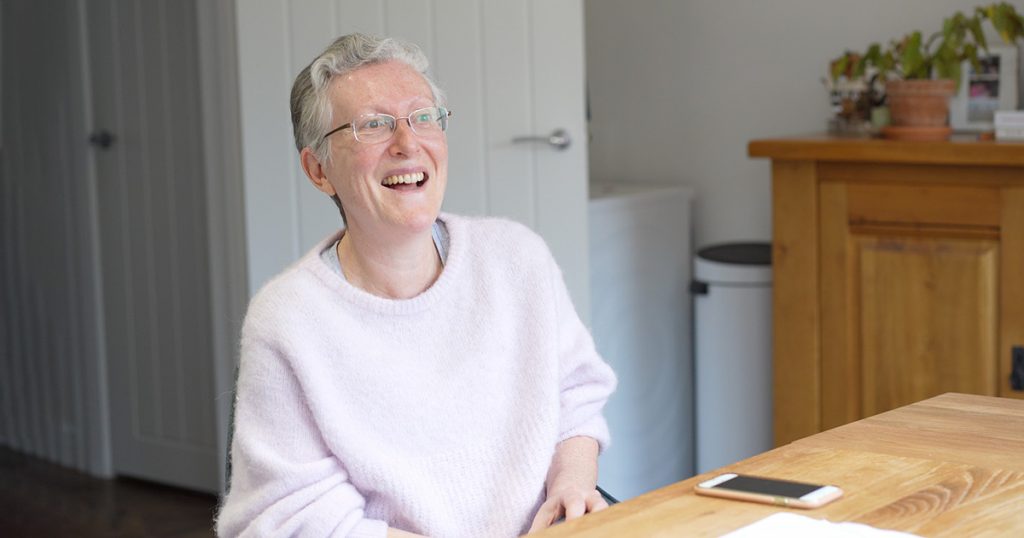
We ask Emma what she thinks ‘success’ really means. She laughs and tells us that she hasn’t prepared anything, before pausing to think. “I think if you can do something, whether you have Parkinson’s or anything else, to make your life better and reduce your symptoms, then that’s success.” Emma’s a fantastic example of this measure of success, though she acknowledges that she’s lucky to have the time and space to do so. With her children fully grown and her job now part-time, Emma has the time to really explore her own therapies and methods to help reduce her symptoms. “I am really lucky, as I have all this time to do my own research and test things out. It’s definitely something that is made easier by having the time to focus.” This focus is rubbing off on others around her; her husband has recently told her he will no longer eat biscuits, inspired by her nutritional efforts. Emma’s gentle influence has seen others around also think differently about themselves, showing her to be inspirational in the truest sense.
Emma’s worked hard to figure out what works for her, and has compiled an entire array of different methods to make her life as good as it can be. Those around her have started to follow her example, which she considers the best way to help someone, and we can see why. Her optimism and investigative approach to improving life is something that we find truly inspiring, and we’re glad to hear that Emma is going to continue to research new ways to find to improve her life. “It’s a never ending journey. You just have to try and make these habits as you go along.”
Richelle Flanagan
Innovation, Research, and Equality
Richelle, a dietitian and cofounder of the Women’s Parkinson’s project, was diagnosed with YOPD a few months after giving birth to her daughter. Since then, she has worked hard to raise awareness of issues that women in the Parkinson’s community face.
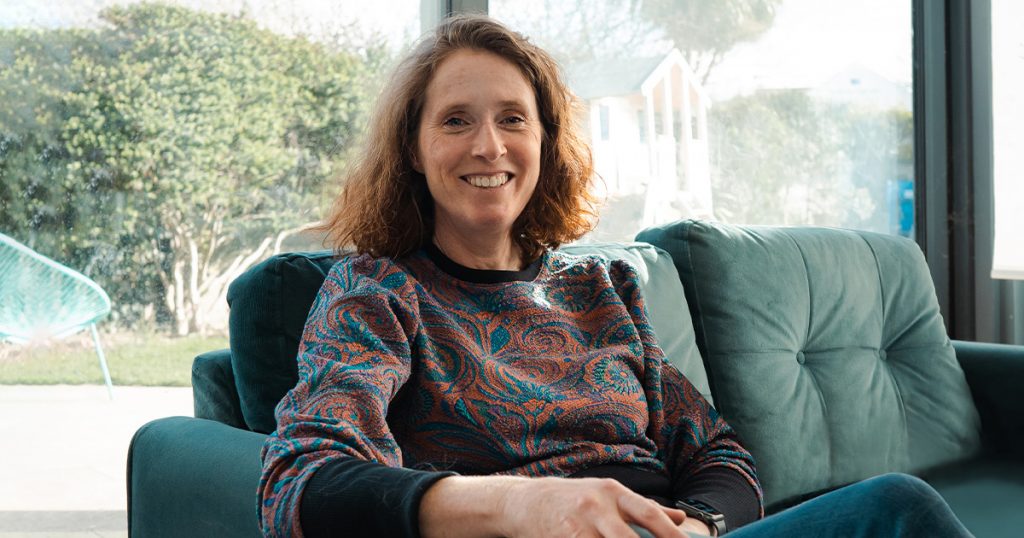
Key to Richelle’s efforts is fighting the stereotypes that surround Parkinson’s, including that it is a condition which predominantly affects men over women. Richelle has also worked to highlight the additional issues that women face. “Much of the housework is done by women, and looking after children too. For someone who has YOPD, they have to cope with all of this alongside their condition and a fulltime job. It’s exhausting.” We ask if she found it hard to cope with her diagnosis alongside a new baby, and she nods. “It was incredibly difficult. It’s something that is so overlooked in the literature, and there’s so little help for it.”
This gradually led Richelle to want to do something to help. She visited Kyoto for the World Parkinson’s Congress (WPC), where she was inspired to talk openly about her diagnosis and to try and find a way forward in helping others. This in turn led her to co-found the Women’s Parkinson’s Project with two other women with YOPD that she met through the WPC. More recently, she was a patient champion for the Day One patient centred digital hackathon. “They asked me if I wanted to enter with an idea, and so I did, despite not originally having gone to enter the competition. We ended up winning the whole competition!”
The idea with which Richelle won the Hackathon, and that she is now carrying on into development, is an app that can be used to track and record women’s symptoms in line with their menstruation cycle. “Oestrogen lowers dopamine, and so when you have Parkinson’s and dopamine is already low, your cycle can greatly affect your symptoms.” Richelle held a survey to find out more about this and discovered that more than 80% reported that their symptoms worsened during the week prior to their period. This can often be dismissed, and so Richelle’s app is a way for people to document their experiences and show clinicians what they’re experiencing, allowing them to take more control of their treatment.
Richelle’s hope is that this app will not only help to show how menstruation can affect Parkinson’s, but that it will grow into an ecosystem where women around the world can access information about Parkinson’s and things that relate to them specifically. “In some parts of Africa, there’s one Parkinson’s specialist to every 100,000 people with Parkinson’s. I hope that this will be a way of giving them the information they need to be informed and in control of their Parkinson’s, improving their quality of life.”
Richelle has been striving to improve the lives of people with Parkinson’s in other ways. As a dietitian, Richelle understands the importance of good nutrition in helping to stay healthy, and yet finds that nutrition is often not talked about when discussing treatments. She works giving talks to ensure that its importance is noted and nutrition is placed alongside things such as exercise in helping those with Parkinson’s.
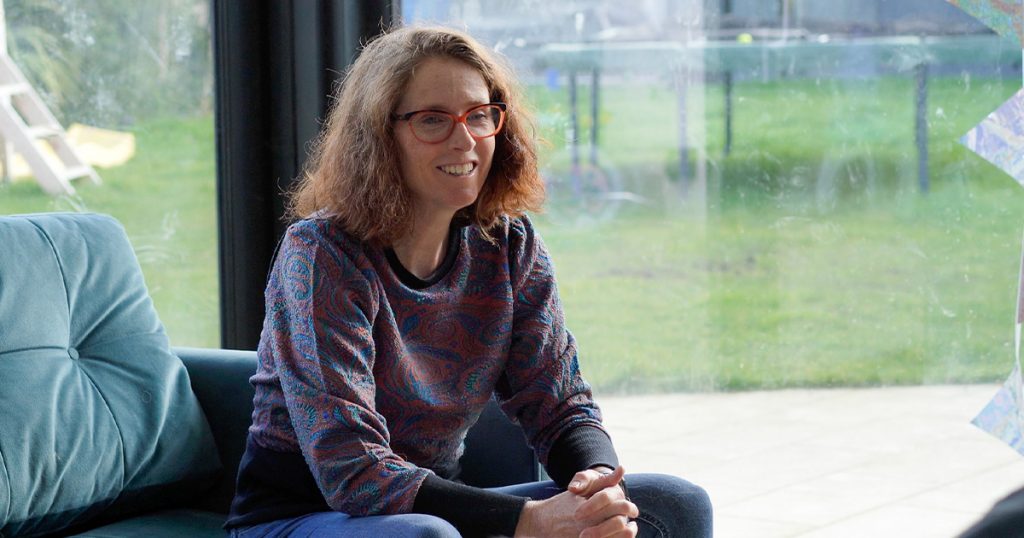
Richelle is very passionate about the need for more gender and sex-based Parkinson’s research. By broadening research efforts, Richelle believes that all people in the Parkinson’s community will benefit. “If you have a narrow focus, then you’ll only have narrow results. If you start to research other things, like issues specific to women or to YOPD, then you’ll learn so much more, and those new things will undoubtedly help everyone.” Richelle’s continuing advocacy is something that we will follow with great interest, as she works to ensure that everyone’s experiences are heard, and that everyone can benefit from a greater breadth of research and understanding.
Success, for Richelle, is tied to helping all in the community improve their lives, and to the betterment of treatments for everyone. This ranges from a better understanding of nutrition and Parkinson’s, to the issues that face women with the condition specifically, and is something that she continues to tirelessly advocate for. Richelle’s strong drive to improve the lives of women with Parkinson’s, and to have their specific issues addressed, is greatly inspirational to all of us at Charco. Her efforts will undoubtedly benefit many women, and we can’t wait to see what she does next.
Thank you
Thank you to Tina, Emma, and Richelle, for sharing their experiences with us. They are inspirations to all of us here at Charco, and are just some of the amazing women that we are lucky to have in our community. Who inspires you? We’d love to hear from you on our social channels Facebook, LinkedIn, Instagram, or Twitter, about how you have celebrated International Women’s Day, and if you’d like to get in touch directly, please email us on [email protected]. Thank you again to Tina, Emma, and Richelle, for sharing their stories; we hope everyone has a great International Women’s Day :).
Stay up-to-date with our progress and be the first to know when CUE1 is available.